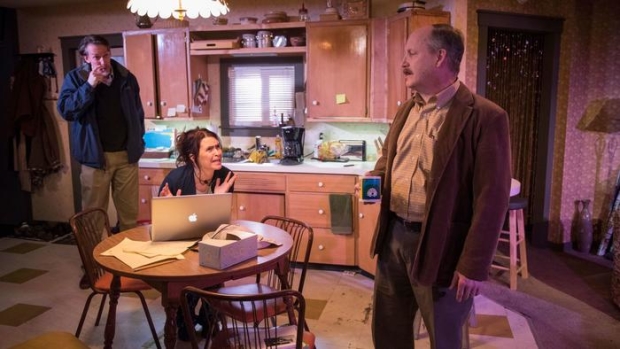There's an Enemy Among the People in Traitor
Michael Shannon directs an updated version of an Ibsen classic.

(© Michael Brosilow)
Henrik Ibsen’s An Enemy of the People, published in 1882, follows the crusade of one Dr. Stockmann, whose concerns about the safety of his town’s curative hot springs drag him into a web of corruption and venality. In playwright Brett Neveu’s modern update, Traitor, making its debut at A Red Orchid Theatre, Ibsen’s Dr. Stockmann is now Dr. Tom Stock (Guy Van Swearingen), a science teacher at a local charter school.
Like so many small towns, the fictional East Lake, Illinois, is blighted and broke following the rise of outsourcing and downturn of factory work in the late 20th century. But East Lake has been miraculously revitalized by the development of a charter school. The idea that a charter school alone could bring prosperity to a destitute town is the first leap of logic that the audience is asked to make, but it is hardly the last.
It is revealed early in Traitor that Dr. Stock, concerned by the lethargy and disinterest of the high schoolers, has sent the schoolyard soil out for chemical analysis. The result is dismal: Dangerously high levels of lead permeate the ground the school is built on. Decontaminating the area will take vast sums of money and several years, and the school will shut down for the duration. The mayor of East Lake (Kirsten Fitzgerald), who is also Dr. Stock’s sister, is skeptical of Tom’s findings and of his motives. Both Mayor Stock and Tom’s wife Karla (Dado) allude to Tom’s history of conspiracy-peddling and rabble-rousing. Only his adult daughter (Missi Davis), a teacher at the school, is inclined to take him seriously. But soon enough, local institutions see Tom’s charter school scandal as a jumping-off point for their own grievances, and the town ignites with controversy.
Traitor offers neither the righteousness of Ibsen’s original nor the sharp bite of satire, instead presenting a scenario where every character is loathsome and spineless, and even if somebody is technically correct, they’re probably not in the right. Neveu’s adaptation incorporates modern contrivances like social media, but outright ignores others that should be unavoidable — notably, the existence of the EPA or any federal relief. The people of East Lake play fast and loose with concepts that never quite line up — notably, and maddeningly, an offer of bribery from Karla’s wealthy, conservative father (Frank Nall) is referred to exclusively within the play as blackmail.
Directed by A Red Orchid ensemble member Michael Shannon, Traitor runs two and a half hours, including one extended scene in a second location, for which the entire audience leaves the theater and is guided to a nearby storefront. While the scene itself, a knock-down, drag-out brawl of a City Council meeting, is the comedic highlight of the play, the value of being on-site does not justify the added time and trouble of relocation, particularly in the depths of Chicago’s winter.
Throughout the play, Van Swearingen, Fitzgerald, and Dado dig their teeth into Neveu’s passionate dialogue with relish. Their supporting cast, however, lacks unity. Talented performers all, their portrayals range from the understated (Davis) to the cartoonish (Natalie West as local business owner Jenn Sheffer). This uneven tone aggravates the already choppy script.
Mike Durst’s lighting design and Brando Triantafillou’s sound design and original music end the play with a effective bang, but John Musial’s detail-filled set exacerbates A Red Orchid’s long, narrow performance space, leading to cluttered and static staging.
Commanding lead performances and a bold mid-play venue change can’t distract from an inconsistent script full of logical leaps and a flawed premise. Traitor is a rare misstep for A Red Orchid.








